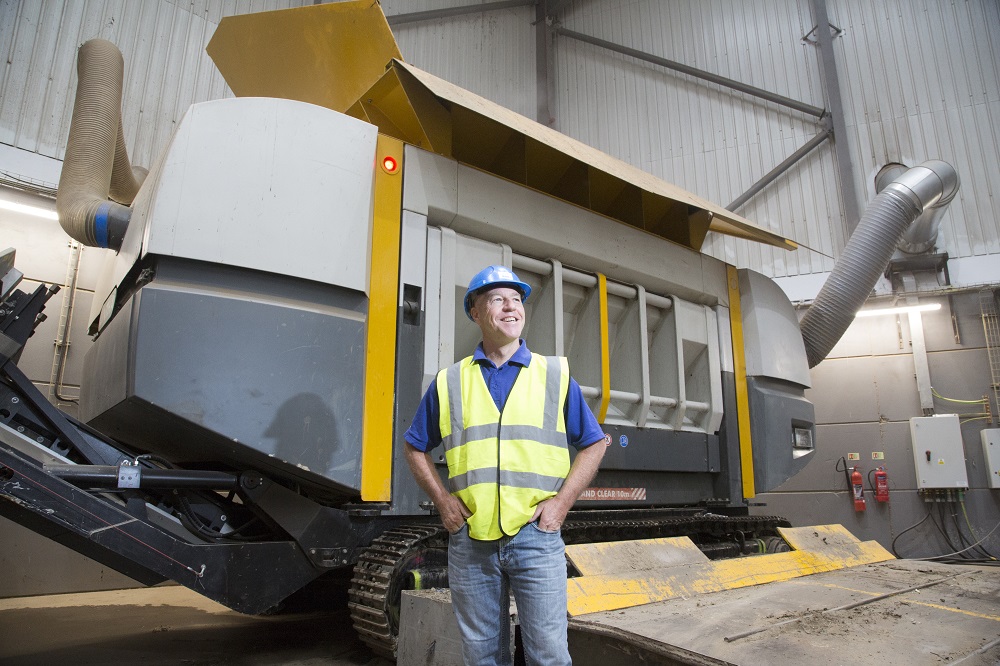
Construction and commercial waste management specialist Rabbit Waste Management Ltd has more than halved the energy required to power its shredding line, resulting in cost savings of approximately £60,000 per year.
Rabbit commissioned the UNTHA XR3000C mobil-e shredder in November 2017, in a bid to lower the level of dust, fines, fire risk and noise of its waste processing operation. But the 60% reduced energy consumption has also resulted in significant financial benefits for the Sussex-based business, not to mention a much smaller net environmental impact.
Rabbit is no stranger to waste shredding. The skip hire firm diverts 75,000 tonnes of locally-collected C&I, C&D and wood waste from landfill each year, in favour of manufacturing an alternative fuel used to run its own 5MW Waste to Energy Enviropower plant. The team previously used a diesel-driven mobile shredder to process infeed materials, but when this high-speed technology failed, the hunt for a safer, more environmentally-sound and profitable replacement began.
An extensive research and due diligence project brought Rabbit to UNTHA’s globally-renowned electric-driven mobile shredder. Capable of comfortably handling 30 tonnes of waste per hour, the machine achieves a homogenous <90mm fuel with ease, to suit Rabbit’s precise RDF specification.
The level of dust has fallen by approximately 50%, the creation of non-specification fines has dropped by 20%, and the shredder’s electric drive coupled with in-built fire protection technology, means the risk of a major incident is drastically reduced.
However, the XR’s lower energy consumption has by far been the stand-out benefit for Rabbit to date.
“We are an eco-friendly organisation which is why we’ve worked hard to manufacture a renewable resource that can be used to generate electricity,” explains director Duncan Barrass. “But to be a truly environmentally robust business, it is only right that we sought a way to cut the amount of energy needed to run our facility in the first place.
“With 60% less energy consumption, equating to around £60,000 per year, the XR’s impact on our ‘green’ agenda – not to mention our bottom line – is vast.”
With its robust cutting concept, the machine is capable of processing various materials to further reduce the amount of complex waste sent for wider treatment or disposal, and the technology can be reconfigured to manufacture different fuel specifications in only three hours. It has been estimated that shredder downtime has also been improved by 20%, when compared to the XR’s predecessor. Plus, with an operational noise level of less than 85dB(A), the wellbeing of employees is far better protected.
“Not only do we no longer need to wear ear defenders – it is also possible to have a conversation, standing next to the XR, when it is running,” Duncan added. “This low noise level was previously unheard of in our sector, but will become increasingly important as H&S, planning and noise pollution laws become tighter and tighter.”
Rabbit powers the UNTHA XR3000C mobil-e shredder using electricity generated from its WtE plant. The parasitic load of the site is 1MW meaning the remaining 4MW can be exported to the grid.
The XR has been purchased from UNTHA outright. Regular maintenance is conducted by Rabbit’s own team of operatives with routine service and optimisation inspections carried out by UNTHA’s nationwide engineers.
“The world of Waste to Energy is fast-paced and frequently changing,” concluded Duncan. “The very purpose of it is to produce fossil fuel substitutes that can vastly improve our resource security as a nation. But in pursuing such a ‘green’ agenda, it is important to invest in solutions that enhance the commercial viability of the whole operation. Our shredding overhaul has fulfilled this brief entirely.”